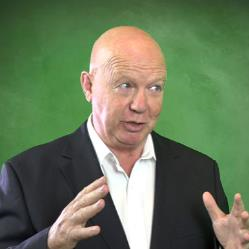 "First agree your role before riding shotgun" - Interview by John Smibert.
"First agree your role before riding shotgun" - Interview by John Smibert.
One of the most important and productive activities of a sales manager is to ride shotgun with his team members when they call on customers. Yet if it's not productive if its poorly executed.
 In my last 2 discussions with sales management guru Bill Carson, we have laid the groundwork for this by discussing '5 facets of sales coaching' and then 'performance coaching'. Now we look at the different roles we can play when riding shotgun.
In my last 2 discussions with sales management guru Bill Carson, we have laid the groundwork for this by discussing '5 facets of sales coaching' and then 'performance coaching'. Now we look at the different roles we can play when riding shotgun.
According to Bill there a 5 alternative roles that a sales manager can perform when going on a call with his salesperson. In this discussion he outlines each of these. He emphasises that we need to be very clear, and gain agreement with the salesperson before the call, as to which of these roles the manager will play
I am a great believer in the immense value of a sales manager spending a significant proportion of their time in the field coaching their sales team members before during and after the customer sales call. Yet this value is realised only if the role each time is planned, agreed and managed
Watch or read the interview below to get insight into the 5 sale management roles that you as a manager should play out during a call.
************
Bill Carson is an alchemist in Sales Mastery, Service Excellence and Personal Leadership. He provides Coaching, Training and Consulting.
See more of the 'TALKING SALES' series here
Interview
John: Hello! Delighted again to have Bill Carson with me - welcome back, Bill!
Bill: Hello, John - great to be back, thank you!
John: Some great discussions we've been having, and what I'd like to do is continue on the theme of sales coaching. You had the five facets of sales coaching, and one of those was around call execution, coaching around the call.
Bill: Yes, yes.
John: We'll talk later about how a sales manager actually behaves on a call and manages that. But before we do that, you've got five roles of a sales manager related to calls. Can you tell me what those five are?
Bill: Yes. The big trap that all sales managers have is they get on calls and they take over.
John: Inexperienced sales managers and new sales managers who are expert salespeople cannot help themselves, can they?
Bill: Exactly, no!
John: And it's the biggest lesson that we all have to learn, and I still struggle with it when I go on a call. "Shut up!" right?
Bill: Yes, exactly.
John: Be the sales coach.
Bill: Yes. There's five roles, and it's really important to be clear what they are:
- First of all, a pure observe role,
- A support role,
- An "advance the sale" role or
- A "model the call" role or
- A "press the flesh" role.
Let me explain those a little bit further. One of the important distinctions is for sales managers to recognise is this an early stage call so that it's not critical, or is it a late stage in the sales process, in the buyer process.
 John: So what you're saying and the way I understand this, you're saying is that on every call that you go on with a salesperson you need ahead of time to find out what your role is as a sales manager on that call, and make sure the salesperson is very clear on that, and therefore you both go into the call with those roles in mind.
John: So what you're saying and the way I understand this, you're saying is that on every call that you go on with a salesperson you need ahead of time to find out what your role is as a sales manager on that call, and make sure the salesperson is very clear on that, and therefore you both go into the call with those roles in mind.
Bill: Yes, absolutely. I'll land the critical message right here, right now, and that is it's so important that the sales manager clarify with the salesperson what his or her role is right upfront. Because if you don't have the conversation, you could be setting up that the salesperson thinks you're not going to be involved, or they might think you are going to be involved, so you've got to have a communication prior to the call and know exactly what the function is.
A lot of managers find it really difficult to just purely observe, and I understand that. They get introduced, they've had their discussion as to what that is, and most of the time they'll be in a support role in the early stages of the buyer's process, and they'll have some discussion as to what my role will be. So, it might be a trigger such as, "You know, John, I'm picking up on what Jennifer has just shared. What about if I ask Jennifer some additional questions?" so something that's agreed as to how you signal it.
John: But agree that ahead of time before you go into the meeting.
Bill: Absolutely, yes.
John: So the pre-planning of the meeting is obviously very vital. Perhaps we can talk about that in another time as well.
Bill: Absolutely, yes. So, much more effectively than you're driving, "Okay, who you're meeting with and how are you going to introduce me?" you've got to be a little bit more sophisticated than that. The third area is if you're advancing the sale, which is totally appropriate, you're going to be coming in later on in the buying process, and using your authority, experience, etc., etc. If you're modelling the call, you'll generally do that with newer salespeople and you've agreed that upfront, and then fifth is pressing the flesh. Sales managers need to be out there - meeting customers, waving the flag, here we are - but they don't take over, and a critical distinction in the call is when the buyer person you're talking with is giving you eye contact, then just turn your head away and look to your salesperson to redirect their attention.
 John: Great suggestion. We talked about the fact that it's very hard to shut up and let the salesperson play their role and you play your role, but so often a sales manager is in a call where the salesperson is struggling and they're probably going to screw the call up.
John: Great suggestion. We talked about the fact that it's very hard to shut up and let the salesperson play their role and you play your role, but so often a sales manager is in a call where the salesperson is struggling and they're probably going to screw the call up.
Bill: Yes. Don't risk it.
John: Don't risk it?
Bill: No, because these days... Well, some sales managers will argue. Just let them have the learning experience; a lot of them don't necessarily want to do that. So you again have the conversation ahead of time. "Look, if you feel, a sales rep, "that you're really struggling here, either flick it to me or else I'll step in. Are you okay with that?" As long as the communication is established upfront; that's critical.
John: At the same time, we all know that we learn from our mistakes. Sometimes it is right to let the salesperson go through that failure, and then afterwards talk about how they would've done it differently. They'll probably learn from that, rather than us taking over and doing it for them.
Bill: Exactly. And that's why if you want to take that risk, you do that with early stage meetings in the buying cycle, so you're not risking dollars.
John: Where we've already invested heavily in the sales cycle.
Bill: Yes, absolutely. So that's where that might be necessarily or desirable.
John: Okay, alright Bill. So, you've talked about the five roles, and you need to find ahead of time what your role is as a sales manager in a call, pre-plan that, and it's not just a quick discussion as you go in the meeting; you actually think it through as part of the call planning process, then you stick to your role unless you've got a major issue.
Bill: Absolutely, yes. Have the conversation ahead of time, be clear about the roles, and the success rate will go up significantly.
John: Thanks, Bill - great suggestion!
Bill: Thanks, John!
*****************************
See further discussions with Bill Carson:
*******************************

Your Invitation: I invite you to join the Sales Leader Forum group on LinkedIn where you can experience informative discussions with your peers and sales thought leaders on subjects like the one we have discussed here. I also invite you to subscribe to the
- Sales Leader Resource Centre here
- Sales Leader YouTube channel here (300+ sales leadership videos)
Please Share: If you valued this article, please share via your Twitter, LinkedIn, Google+ and Facebook social media platforms. I encourage you to join the conversation or ask questions. So feel free to add a comment on this post - I promise to respond. If inclined please follow my LinkedIn post page here.
Want to touch base? If you have questions please feel free to contact me - email: john.smibert(at)salesleaderforums.com, Phone: +61 404857893 or Skype: john.smibert